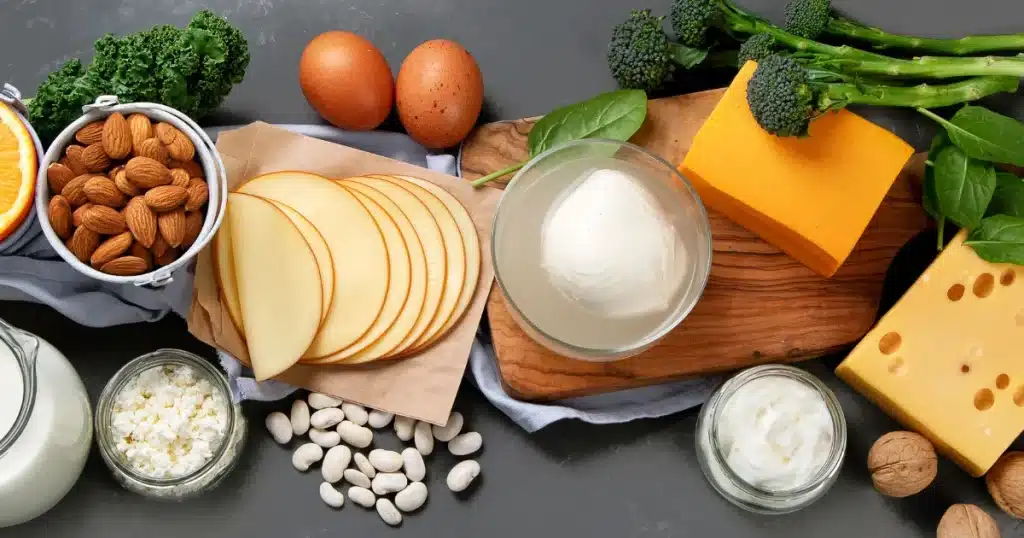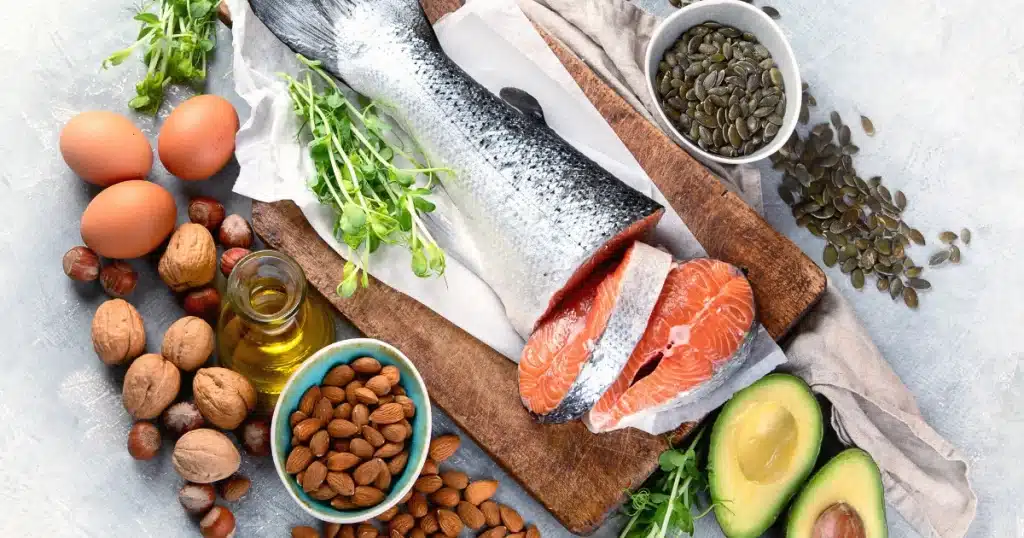Level Up Your Nutrition Game With Our Freebies
Alex
I provide nutrition coaching for endurance athletes to improve performance and body composition through a simple and flexible eating style.
Hi, I'm
ATHLETE EATING GUIDE →
LEARN MORE →
ATHLETE GROCERY SHOPPING GUIDE →
10-DAY PROTEIN-PACKED SAMPLE MEAL PLAN
READY TO FUEL?
incredible value!
The fueling guide bundle serves as your one-stop-shop for strategies to fueling before, during and after your workouts.

What nutrients do plant-based runners need? Runners who eat a plant-focused diet have unique nutrient needs to maximize athletic performance and promote overall health.
Studies have shown that vegetarian and vegan diets can be low in important nutrients. Because of this, extra thought and preparation are needed to prevent nutrient deficiencies and related consequences. Keep reading to learn more about some key nutrients to prioritize and focus on as a plant-based runner!
What Nutrients Do Plant-based Runners Need?

Are you a plant-based runner looking to optimize your performance nutrition?
Micronutrients are an important component of an athlete’s diet. Many of our bodily processes require vital nutrients to work the way we want them to. And lots of these nutrients need to be consumed through the food you eat.
When a diet is low in specific nutrients for an extended period of time, the stores inside your body dwindle down and your levels become low. You may feel unwanted symptoms or see a decrease in your performance during training.
Since plant-focused diets omit certain food groups, plant-based athletes are at an increased risk for nutrient deficiencies. This includes vitamin B12, iron, calcium, and omega-3 fatty acids. These four nutrients are abundant in animal products and low in plant foods.
However, with the right knowledge and planning, you can still get all the nutrients you need while eating a plant-based diet. Tons of plant-based runners are able to dial in on a solid fueling and supplement strategy in order to reach their performance goals.
If you haven’t already, make sure to check out our complete blog post on fueling for plant-based athletes! It is packed with important information about a plant-based eating style.
Iron
Iron is an important mineral inside your body that aids in growth and development. It is essential for making hemoglobin, a protein in your red blood cells.
There are also several benefits that iron has on running and endurance, which is why you want to make sure you are getting the amount you need to perform your best.
Recommended daily intake of iron is:
- Men: 8 mg/day
- Premenopausal women: 18 mg/day
- Postmenopausal women: 8 mg/day
Dietary iron can be broken up into two types: heme and non-heme iron. Heme iron is better absorbed by your body and is present in only animal food sources. Non-heme iron is less absorbable and can be found in plant foods and fortified products.
Since a plant-based diet lacks heme iron and relies solely on non-heme iron sources, plant-based athletes are encouraged to up their iron intake to compensate. Research shows that vegetarians may need to as much as double their intake of iron.
Plant foods that are high in non-heme iron include:
- Fortified breakfast cereals
- Beans
- Dark chocolate
- Lentils
- Spinach
- Potato w/ skin
- Nuts and seeds
If you are worried about your iron levels as a plant-based athlete, I recommend getting bloodwork done at least every 6-12 months to see where you are at. This can help you gauge if you may want to consider an iron supplement to replenish your levels.
Bonus tip: vitamin C is a vitamin that helps iron absorption in your body. Pair your iron-rich foods with a food high in vitamin C such as spinach, citrus fruits, and tomatoes.
Calcium

Another nutrient to be aware of is the most abundant mineral in your body, calcium! Calcium is involved in many bodily processes, including the movement of muscles and giving structure to teeth and bones.
Since calcium is vital for bone health, athletes should be particularly cautious of their calcium levels. Poor bone health can lead to a decrease in athletic performance and an increase in risk for injuries.
Calcium is mainly abundant in dairy products. Since many plant-based diets choose to omit dairy, this can greatly reduce calcium intake.
Recommended daily intake for calcium:
- Adults 19-50 years: 1000 mg
- Adult men 51-70 years: 1000 mg
- Adult women 51-70 years: 1200 mg
Some plant foods have small amounts of calcium, but to reach your daily intake, you may want to consider fortified foods or a calcium supplement. A fortified, plant-based milk alternative is a great option to use with cereal, smoothies, and more, to get some calcium into your day.
Plant foods highest in calcium:
- Kale, broccoli, bok choy
- Soybeans
- Fortified products: fruit juice, milk alternatives (soy, almond), ready-to-eat cereals
- Whole grains have a small amount of calcium
Vitamin B12
A deficiency in vitamin B12 is also common in plant-based athletes. Vitamin B12 is a vitamin that helps make DNA and keeps your body’s blood and nerve cells healthy.
It is another nutrient that plays an important role in athletic performance. Many athletes with low B12 levels report fatigue and a decreased ability to perform. Which for obvious reasons, is not ideal!
Recommended daily intake for vitamin B12:
- Adults: 2.4 mcg
- Pregnant women: 2.6 mcg
- Breastfeeding women: 2.8 mcg
Vitamin B12 is found in high amounts in animal-based foods only, such as meat and poultry, eggs. Because of this, athletes who choose a plant-focused diet, especially vegan, are at an increased risk for B12 deficiency. With no plant foods containing B12, a supplement is most likely necessary.
My preferred supplement company, Thorne Research, has a great liquid B12 supplement that is vegan-friendly. Head over to this link for 15% off your order!
Omega-3 Fatty Acids

The last main nutrient of concern for plant-based runners is omega-3 fatty acids. Omega-3s are a group of polyunsaturated fats that are known to have many health benefits. They are typically found in seafood and fish, so plant-based athletes who omit seafood are at a higher risk for deficiency.
Since these fatty acids affect many aspects of metabolism and bodily functions, research shows that they can impact outcomes related to sports performance and illness/injury recovery. While the science is still emerging, it is thought that omega-3s can improve muscle mass and influence the skeletal muscle response to exercise.
For specifically endurance athletes, omega-3s may help to increase oxygen delivery to the muscles. We know that improved oxygen uptake can enhance endurance performance.
Recommended daily intake for omega-3s:
- Adult men 19-50 years: 1.6 g
- Adult women 19-50 years: 1.1 g
- Adult men 51+ years: 1.6 g
- Adult women 51+ years: 1.1 g
The three main omega-3s are alpha-linolenic acid (ALA), eicosapentaenoic acid (EPA), and docosahexaenoic acid (DHA). ALA is found mainly in plant oils, while EPA and DHA are found in fish and seafood. Most plant-based diets, besides pescatarians, omit fish and seafood, so ALA will be your source of omega-3s.
It’s important to note that your body can only convert some ALA to EPA and DHA. Therefore, a supplement may be helpful if you don’t eat fish or seafood. Many brands make an omega-3 supplement that comes from algae and is 100% plant-based.
Plant-based sources of omega-3s (ALA):
- Flaxseeds and flaxseed oil
- Chia seeds
- Walnuts
Action tip: add flax and chia seeds into a glass jar and sprinkle on top of smoothies, oatmeal, and greek yogurt for an added boost of plant-based omega-3s!
Plant-based Runners: The Takeaway
Even though a plant-based diet may be limited in certain nutrients, your performance does not need to suffer. Now you are equipped with the basic knowledge you need to plan ahead and prevent nutrient deficiencies before they start.
If you are looking to take your performance nutrition to the next level, our team of specialized sports dietitians is here for you. We love working with plant-based runners and have seen amazing success! Head over to our services page to learn more about our premium coaching programs for athletes. There is no better time to invest in your health!
Alex
I provide nutrition coaching for endurance athletes to improve performance and body composition through a simple and flexible eating style.
Hi, I'm
LEARN MORE →
take the quiz!
Let's discover your Endurance Nutrition IQ
How well do you know your fueling? Answer these questions and let's see where your endurance nutrition knowledge is at!
Take the quiz
level up your nutrition game with these freebies
free downloadS
Protein-Packed 10-Day Sample Meal Plan
Athlete Eating Guide
Athlete Grocery Shopping Guide
1
2
3
Inspiration to fit 120 grams of protein into your day
Planning what goes on your plate
Putting the right foods in your grocery cart
